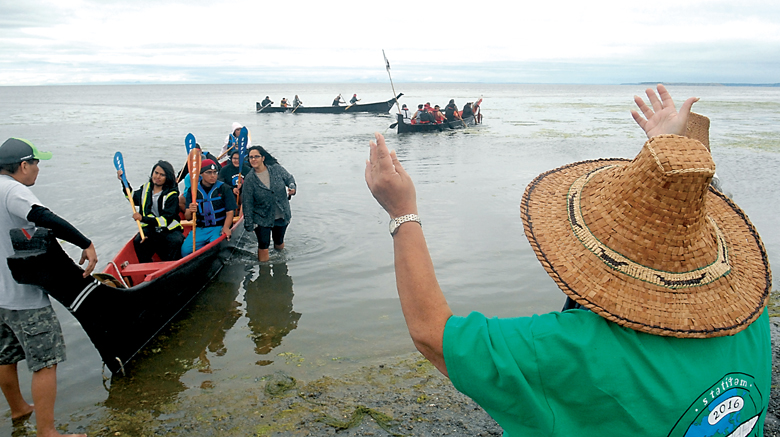PORT TOWNSEND — Pullers in the 2016 Canoe Journey are expected to depart Port Townsend for Port Gamble today.
The exact time of departure was being determined Saturday evening, said Sonja Elofson, Lower Elwha Klallam tribe Canoe Family coordinator.
“Each night they have a skipper’s meeting where the people who are directing the canoes” review weather forecasts and tide schedules to determine when would be the best time to leave, she said.
North Olympic Peninsula tribes began joining the Paddle to Nisqually on July 8, as the Quinault left their shores.
They have since been joined by a flotilla of canoes including the Hoh, Quileute, Makah, Lower Elwha Klallam, Jamestown S’Klallam tribes. Port Gamble S’Klallam paddlers were expected to join the journey today.
Participants plan on reaching the end of their journey at Port of Olympia by July 30. There, the Nisqually tribe will host tribes from Oregon to British Columbia for potlatches, ceremonies and celebrations through Aug. 6.
Along the way, participating tribes visit other tribes to celebrate their common ancestry and culture. Before they land, they ask the host tribe for permission to come ashore.
PA departure
About 26 canoes representing Canadian first nations and North Olympic Peninsula tribes departed Port Angeles on Friday, making their way to the Jamestown beach where they were greeted with a welcoming ceremony hosted by the Jamestown S’Klallam tribe.
Among those waiting on shore were dozens of children singing songs in greeting.
More than 200 people watched as the tide came in, and along with it, the first of a flotilla of canoes.
The first arrival, a canoe belonging to the Quileute Tribe of La Push, had difficulty navigating the still-too-shallow approach to shore and had to forego the traditional circle before landing.
Elaine Grinnell, a Jamestown elder who was helping to welcome incoming pullers, said the crew would be forgiven for skipping the swing-by.
Theresa R. Lehman, a member of the Jamestown S’Klallam tribal council who was tag-teaming the duty of welcoming incoming canoes, said it was important to remember the traditions of the past and revive the ones that had fallen by the wayside.
“It’s only been the last 15 or 20 years that I have learned about my culture and I think it’s great that many tribes are relearning their culture, but (many) haven’t gathered together like this, like they did over a hundred years ago,” she said.
“Our ancestors are up in Heaven, enjoying and rejoicing.”
Lehman stressed the importance of having younger generations involved in paddle journeys, both as participants and as witnesses. It would be up to them to keep the traditions alive.
“I think it’s great for our children to learn this so they can understand the relationship between the tribes,” she said. “That’s important so they can learn the culture and educate.”
Jamestown departure
On Saturday, the canoes departed Jamestown Beach at about 8 a.m., traveling to Fort Worden in Port Townsend where they were expected to arrive in the mid- to late-afternoon, said Vickie L. Carroll, Jamestown S’Klallam tribal Canoe Journey coordinator, Saturday morning.
Three tribes — Jamestown S’Klallam tribe, the Lower Elwha Klallam tribe and the Port Gamble S’Klallam tribe — worked together to welcome the paddlers at Fort Worden, she said.
Elofson said it is important for the three tribes to work together in Port Townsend, “because this is an area where there is not technically a reservation, [but] is a common area in between all of the Klallam tribes.”
The three tribes, before the arrival of white settlers, were one large tribe living in family groups that spanned across the North Olympic Peninsula from Hood Canal on the east to the Hoko River on the west, Carroll said.
Colonization resulted in the Peninsula’s three main groups of S’Klallams — the Port Gamble to the east near Kingston, the Jamestown at Sequim and the Lower Elwha west of Port Angeles, she said.
When the federal government recognized the S’Klallam people, they were considered as three separate tribes based on geography, although they are one people by ancestry, Carroll said.
That common link is apparent in the songs each group sings, Elofson said.
The three tribes “have very similar, if not the same, songs,” she said.
“Usually when we perform, we perform separate, but Canoe Journeys is a time for us to actually sing together.”
That includes the “Klallam Welcome Song,” which was composed in 1995 by all three S’Klallam tribes in effort to keep the native language alive through song, said Wendy Sampson, Lower Elwha Klallam tribe drum group coordinator and language teacher.
Some of the other songs heard at the ceremony have been sung at similar gatherings for “hundreds if not thousands of years,” she said.
The annual Canoe Journey teaches younger generations the songs, language and protocol observed by their ancestors participating in similar journey in years past, Sampson said.
“It was important in historical times to have potlatches where you had intertribal gatherings,” she said.
“Marriages would be formed, relationships would be formed between tribes, and I think when they revived the Canoe Journey in 1989, a lot of that was to bring back” ancient traditions, she said.
“It gives tribes a chance to intermingle in positive way.”
After Saturday’s ceremony, participants traveled to the Jefferson County Fairgrounds, where a large crew of local volunteers had prepared and served a barbecue dinner, Carroll said.
________
Features Editor Chris McDaniel can be reached at 360-452-2345, ext. 56650, or cmcdaniel@peninsuladailynews.com.
Keith Thorpe is the Peninsula Daily News photographer.

